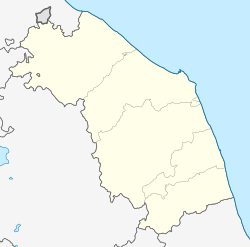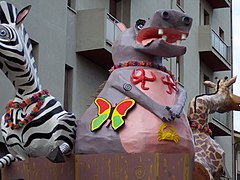Pesaro
Pesaro
Pés're (Romagnol) | |
|---|---|
| Città di Pesaro | |
 | |
| Coordinates: 43°55′N 12°54′E / 43.917°N 12.900°E | |
| Country | Italy |
| Region | Marche |
| Province | Pesaro e Urbino (PU) |
| Frazioni | Borgo Santa Maria, Candelara, Case Bruciate, Casteldimezzo, Cattabrighe, Chiusa di Ginestreto, Colombarone, Fiorenzuola di Focara, Ginestreto, Monteciccardo, Novilara, Ponte Valle, Pozzo Alto, Santa Maria dell'Arzilla, Santa Marina Alta, Santa Veneranda, Trebbiantico, TrePonti, Villa Ceccolini, Villa Fastiggi, Villa San Martin |
| Government | |
| • Mayor | Matteo Ricci (PD) |
| Area | |
| • Total | 126.77 km2 (48.95 sq mi) |
| Elevation | 11 m (36 ft) |
| Population (21 October 2011)[2] | |
| • Total | 95,000 |
| • Density | 750/km2 (1,900/sq mi) |
| Demonym | Pesaresi |
| Time zone | UTC+1 (CET) |
| • Summer (DST) | UTC+2 (CEST) |
| Postal code | 61121, 61122 |
| Dialing code | 0721 |
| Patron saint | St. Terence |
| Saint day | September 24 |
| Website | Official website |



Pesaro (Italian: [ˈpeːzaro] ; Template:Lang-rgn) is a city and comune (municipality) in the Italian region of Marche, capital of the province of Pesaro and Urbino, on the Adriatic Sea. According to the 2011 census, its population was 95,011, making it the second most populous city in the Marche, after Ancona. Pesaro was dubbed the "Cycling City" (Città della bicicletta) by the Italian environmentalist association Legambiente in recognition of its extensive network of bicycle paths and promotion of cycling. It is also known as "City of Music" (Città della musica), for it is the birthplace of the composer Gioachino Rossini. In 2015 the Italian Government applied for Pesaro to be declared a "Creative City" in UNESCO's World Heritage Sites. In 2017 Pesaro received the European City of Sport award together with Aosta, Cagliari and Vicenza.
Local industries include fishing, furniture making and tourism. In 2020 it absorbed the former comune of Monteciccardo, now a frazione of Pesaro. Its frazione of Fiorenzuola di Focara is a member of the I Borghi più belli d'Italia ("The most beautiful villages of Italy") association.[3]
History
The city was established as Pisaurum by the Romans in 184 BC as a colony in the territory of the Picentes, the people who lived along the northeast coast during the Iron Age.[4][better source needed] In 1737, fourteen ancient votive stones were unearthed in a local farm field, each bearing the inscription of a Roman god; these were written in a pre-Etruscan script, indicating a much earlier occupation of the area than the 184 BC Picentes colony.[4]
A settlement of the Picentes tribe has been found at Novilara. The northern Picentes were invaded in the 4th century BC by the Gallic Senones, earlier by the Etruscans, and when the Romans reached the area the population was an ethnic mixture. The Roman separated and expelled the Gauls from the country.
Under the Roman administration Pesaro, a hub across the Via Flaminia, became an important centre of trading and craftmanship.[citation needed] After the fall of the Western Empire, Pesaro was occupied by the Ostrogoths, and destroyed by Vitigis (539) in the course of the Gothic War. Hastily rebuilt five years later after the Byzantine reconquest, it formed the so-called Pentapolis, part of the Exarchate of Ravenna. After the Lombard and Frankish conquests of that city, Pesaro became part of the Papal States.
During the Renaissance it was ruled successively by the houses of Montefeltro (1285–1445), Sforza (1445–1512) and Della Rovere (1513–1631). Under the last family, who selected it as capital of their duchy, Pesaro saw its most flourishing age, with the construction of numerous public and private palaces, and the erection of a new line of walls (the Mura Roveresche). In 1475, a legendary wedding took place in Pesaro, when Costanzo Sforza and Camilla d'Aragona married.[5]
On 11 September 1860 Piedmontese troops entered the city, and Pesaro was subsequently annexed to the new Kingdom of Italy (see also Battle of Castelfidardo).
Government
Main sights
Buildings and museums
- Ducal Palace (15th century): commissioned by Alessandro Sforza, the façade has a portico with six arcades supported by six heavy pilasters and an upper floor with five windows crowned by coats of arms, festoons and puttoes.
- Rocca Costanza (15th century): massive castle built by Costanzo I Sforza; it has a square plan with four cylindrical corner towers and a wide dry moat. Later used as prison.
- Villa Imperiale of Pesaro (c. 1530): suburban palace with gardens designed by Girolamo Genga for Duke Francesco Maria Della Rovere and his duchess Eleanora[6] and built from c. 1530 onwards, stands atop the San Bartolo hill. Its sunken court is the direct precedent for the more famous one at the Roman Villa Giulia.[7] Rooms are frescoed by prominent Mannerist painters Bronzino, Francesco Menzocchi, Girolamo Genga, and Raffaellino del Colle.
- Mura Roveresche (17th century): "Della Rovere Walls", demolished in the early 20th century), only two gates, Porta del Ponte and Porta Rimini, and a short section remain.
- Birthplace of Gioachino Rossini: now a museum dedicated to the composer, located at 34 Via Rossini. It has a museum with manifestos, prints, portraits and his spinet.
- Conservatorio Statale di Musica Gioachino Rossini: located in the 18th century Palazzo Olivieri–Machirelli on the Piazza Oliveri.
- Musei Civici di Palazzo Mosca: civic museum which contains mainly paintings and ceramics. Among the art is the Pesaro Altarpiece by Giovanni Bellini.
- Oliveriano Archeologic Museum and Oliveriana Library:[8] archaeological Collection and Manuscript Library; founded in 1756 by Annibale degli Abati Olivieri.
- Villino Ruggeri: notable early 20th century art nouveau home, designed by Giuseppe Brega.
Churches and other religious buildings
- Pesaro Cathedral (5th-14th centuries): Romanesque-Gothic Basilica built over remains of a late Roman edifice and dedicated to St Terence during the Middle Ages. The façade, in Romanesque-Gothic style, is unfinished: it has a simple ogival portal surmounted by a band of small arches. A recent restoration has brought to light floor mosaics.
- The Baroque Sanctuary of Beata Vergine del Carmelo (18th century).
- Church of the Maternità
- Santissima Annunziata
- Oratory of the Nome di Dio
- San Giacomo
- San Giovanni Battista
- Sant'Agostino
- Santa Lucia
- Municipal Chapel of Sant'Ubaldo
- Church and Convent of the Girolimini
- Madonna del Porto
- Santa Maria delle Grazie
- Pieve di Ginestreto
- Pieve di Santo Stefano
- Santa Veneranda
- Sacred Grove of Lucus Pisaurensis, pre-Roman era sacerdotal lucus
Cultural events and attractions
The Pesaro film festival (Mostra Internazionale del Nuovo Cinema) has taken place in Pesaro since 1965.[9]
The Rossini Opera Festival has taken place every summer since 1980 in Pesaro, home as well as the Conservatorio Statale di Musica "Gioachino Rossini" founded with a legacy from the composer.
Sport
Pesaro hosts the home games of Victoria Libertas basketball; they play at the Adriatic Arena, the third biggest Italian indoor arena behind Mediolanum Forum in Milan and PalaLottomatica in Rome.
The city's other professional sports clubs are futsal club Pesaro Calcio a 5, volleyball club Volley Pesaro and football club Vis Pesaro dal 1898.
The city hosted the 2017 Rhythmic Gymnastics World Championships.
Notable people
- Anna Maria Alberghetti (born 1936), singer and actress
- Massimo Ambrosini (born 1977), footballer
- Pasquale Bini (1716–1770), violinist
- Antonello Bonci, neuroscientist
- Francesco Braschi (born 2004), racing driver
- Roberto Burioni, physician and professor of microbiology and virology
- Bartolomeo Campi (died 1573), artist and military engineer
- Stefano Gabellini (born 1965), racing driver
- Matilde Leonardi, neurologist and paediatrician
- Filippo Magnini (born 1982), swimmer
- Gianni Morbidelli, Formula One driver
- Cristiano Mozzati, drummer for Lacuna Coil
- Luca Nardi, professional tennis player
- Riz Ortolani (1926–2014), film composer
- Angelo Romani (1934–2003), Olympic swimmer
- Graziano Rossi (born 1954), motorcycle racer and father of Valentino Rossi
- Gioachino Antonio Rossini (1792–1868), composer
- Dorino Serafini (1909–2000), motorcycle racer and racing driver
- Giovanni Sforza, condottiero and first husband of Lucrezia Borgia
- Renata Tebaldi, operatic soprano
- Giuseppe Vaccai (1836-1912), painter
- Gaius Suetonius Paulinus (~40AD), Roman General and Governor of Britain
International relations
Twin towns – sister cities
Pesaro is twinned with:[10][11][12]
Partnership
See also
- Pesaro railway station
- Alessandro Sforza
- Lucus Pisaurensis
- Votive Stones of Pesaro
- Costanzo Sforza
- Romagna
- Pesaro Angels
- Palazzo Baldassini, Pesaro
References
- ^ "Superficie di Comuni Province e Regioni italiane al 9 ottobre 2011". Italian National Institute of Statistics. Retrieved 16 March 2019.
- ^ "Popolazione Residente al 1° Gennaio 2018". Italian National Institute of Statistics. Retrieved 16 March 2019.
- ^ "Marche" (in Italian). Retrieved 1 August 2023.
- ^ a b "History of Pesaro, Italy".
- ^ A Renaissance Wedding: The Celebrations at Pesaro for the Marriage of Costanzo Sforza & Camilla Marzano D'Aragona (26–30 May 1475): (Studies in Medieval and Early Renaissance Art History). Harvey Miller Publ., 2013, ISBN 978-1905375936
- ^ Andrew Hopkins, 2002. Italian Architecture from Michelangelo to Borromini, p.23f.
- ^ Hopkins 2002 p 24.
- ^ Oliveriano Museum http://www.euromuse.net/en/museums/museum/view-m/museo-archeologico-oliveriano
- ^ "Pesaro film festival site".
- ^ "Pesaro". italien.de (in German). Italien.de. Retrieved 2019-12-22.
- ^ "Pesaro". primaria-resita.ro (in Romanian). Reșița. Retrieved 2019-12-22.
- ^ "Si rafforza il gemellaggio Pesaro-Kakegawa. Cerimonia del tè verde con la delegazione giapponese guidata dal sindaco Saburo Matsui". pu24.it (in Italian). PU24. 2019-11-15. Retrieved 2019-12-22.
- ^ "Collaborazione internazionale". rovinj-rovigno.hr (in Italian). Rovinj. Retrieved 2019-12-22.
External links












